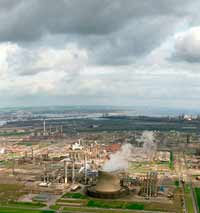New bioethanol plant starts taking in UK wheat

Bioethanol production at the new Ensus plant at Wilton, Teesside, should begin early in the New Year, according to the company’s bosses.
The £300m plant is nearing the final stages of commissioning and has already taken “several thousand” tonnes of UK feed wheat into store in preparation for the start of bioethanol production. The biggest intake was some 5,000t of wheat delivered on Tuesday (8 December), with more due to be brought in over the coming weeks.
Once operational, the facility will produce one-third of the UK’s total bioethanol requirements, from 1.2 m tonnes of home-grown feed wheat, supplied exclusively through Glencore. In addition, it will become one of Europe’s largest animal feed producers, supplying around 340,000t of high protein distillers dry grains – the main by-product from ethanol production.
“I’m confident the plant will be online over the next few weeks and once fully operational, it’ll be the largest wheat biorefinery in the world,” chief executive Alwyn Hughes told a press visit to the site on Monday (7 December).
The DDGS animal feed produced was a crucial part of the business, as it reduced reliance on imported soy meal, mainly from South America, and meant that the ethanol plant produced both food and fuel, he said.
Glencore will be the sole agents for the grain and animal feed, but specific bioethanol contracts will not be available to growers at this stage, Ensus wheat and animal feed manager Stewart Easdon added. “At the moment we’re just buying standard feed wheat, so it is yield that’s the most important factor for growers to consider.
“But once the plant is up and running we’ll monitor the processes to see what works well. If there’s a particular trait or variety that performs best, we’ll encourage farmers to provide it and that may well mean issuing specific contracts.”
The plant’s opening is likely to change the dynamics of grain movement in the UK, and more grain could be shipped around the country by boat, rather than moved by road, he said. Ensus predicts that between half and two-thirds of the plant’s grain requirements will arrive by vessel and the company is also looking at bringing grain in by rail.
Ensus facts
| Company formed in 2006
| £250m private investment, plus c.£60m from associated companies
| £1.9m government grant from One North East
| Operational by Jan 2010?
| Annual feed wheat requirement of 1.2m tonnes
| Three main refinery outputs:
o 340,000t high-protein animal feed (DDGS) sold to Glencore
o 410m litres bioethanol sold to Shell for blending
o 340,000t carbon dioxide – sold to Yara for food and drink use
| 60% greenhouse gas saving from using bioethanol rather than petrol
Refinery facts
| Around 3,000t of grain will be used per day, delivered by:
| 150 lorries per day between 6am and 6pm
| 30,000t of grain storage capacity (10 day’s worth)
| 7000t store for DDGS
| Conversion of grain to bioethanol takes 72 hours
| 67 people employed when operating

